Just words
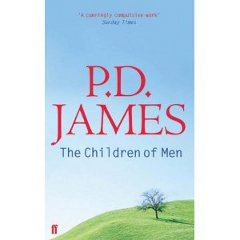
The Children Of Men 
By P. D. James, 288 pages, published the 5th January 2006 by Faber and Faber (978-0571228522)
Short fiction book below 300 pages, only two chapters, with a very simple, but imaginative premise: human race facing extinction because it has lost its ability to conceive.
The first chapter comes to be an analysis of the situation, of the problems that arise to the aging population; this analysis is surely naive, but it draws a very interesting scenario, as interesting as it is also the thinking of the main character, a solitary middle aged man disecting his past life and current situation.
The second chapter seems, at first glance, written by a different author. While the first chapter is slow, it becomes now a continuos action, but the situations seem casted out of the careful scenario drawn on the first part, converging finally in a very abrupt ending. And it is that short ending that contains the morality of the whole book; the book ends, the reader starts thinking. Compelling book.

The Little Stranger 
By Sarah Waters, 512 pages, published the 5th January 2010 by Virago Press Ltd (978-1844086061)
Wonderful book, gets you completely immersed in the story, in Britain after the World War II. Great work evoking the atmospheres: the rural doctor, the decaying great house, the changing times.
At moments it would remind me to Stephen King stories, not for the style, but for the way King has to write completely normal stories that suddenly develops into full terror, weather cataclysms usually included. The Little Stranger shifts also slowly into a horror thread, but which does not devour the story, and just lingers as some background mystery.
The pace is always slow, the characters, solidly built, and all the descriptive writing admirable. In two words: beautifully written; still wondering, anyway, about the title choice . . .
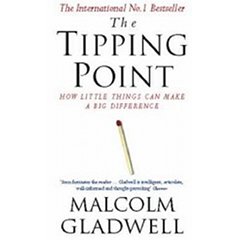
The Tipping Point 
By Malcom Gladwell, 288 pages, published the 1st August 2001 by Abacus (978-0349113463)
Interesting reading; it states something observable -small changes being able to have a large impact-, proposes a theory -3 rules governing those changes- and shows real scenarios as examples and proofs of the theory. This theory is based on the importance of the people starting or propagating the changes, the context on which the changes happen, and how are them propagated.
All together, it exposes very convincing scenarios, and shows a lot of creative thinking to build up the theory, as simplistic as it looks. But, where is the good, the benefits of the book? Would anyone be able to tip a trend with the information contained in this book? No, no way. The author describes what can produce a change, not how or why it happens. What it does is to show that, if a major change is required, perhaps looking for very small changes could perform the magic.
I find this idea remarkable, but not at all inspirational. And I also doubt that the exposed theory, although well built, is complete. At all.
In any case, an appealing book, even if only for the described scenarios, the analysis performed on them, and the insights from the author.
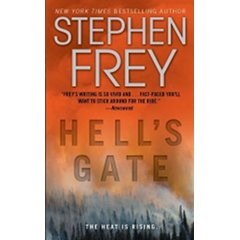
Hell's Gate 
By Stephen Frey, 480 pages, published the 27th July 2010 by Pocket Star (978-1416549666)
Simple, easy lecture, absolutely nothing to highlight about a book that looks more like an average script for a basic thriller movie. As such, in fact, does not result a boring book, just rather lame. And the lamest note goes to the abrupt anticlimax of the short ending, whose only quality is that it serves to end faster the book.
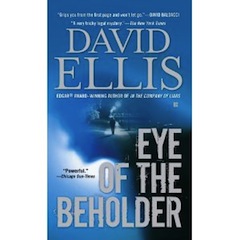
Eye Of The Beholder 
By David Ellis, 400 pages, published the 5th August 2008 by Berkley Trade Pub (978-0425222911)
Another thriller, immediately after the Greg Iles one, so some comparisons are inescapable. This story is far much better, with more twists than a hundred episodes telenovela; however the writing is not so gripping, with my attention drifting away many times.
Having to choose just one of the two books, I would better recommend The Devil's Punch, but I will definitely search soon for another story by David Ellis.
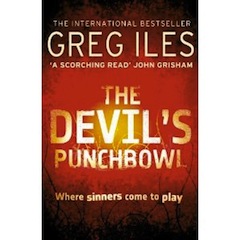
The Devil's Punchbowl 
By Greg Iles, 560 pages, published the 6th August 2009 by Harper (978-0007304844)
The story is very good, with the truth hidden enough as to ensure a proper ending; the characters, a bit on the very special side, making the background a bit weak for an otherwise great book.
Lots of action, some suspense, bits of love affairs, pages are turned at increased speed, difficult to drop the book before getting to its end. Fully recommended.
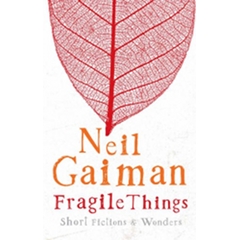
Fragile things 
By Neil Gaiman, 440 pages, published the 5th April 2007 by Headline Review (978-0755334155)
27 fragile things, plus another short story hidden in the introduction -the Mapmaker-, most very distinct, just a full praise to the imagination and smooth writing of Neil Gaiman.
Some are short, others are very short, with just a few spawning over more than 20 pages; my favorite one, 'The Day The Saucers Came', is only 2 pages long.
The first page contains a few reviews of the book and one summarizes too well my impression: 'The chimerical stuff of nightmare and daydream', by USA Today. As it stands, this is a book that I very much appreciate, but I doubt I really enjoyed it. I have been reading the book on and off for more than one year, and some stories are really unsettling, like nightmares where nothing bad really happens but wake you up and then linger unpleasantly in your mind.
A great collection of short stories that I doubt I will want to re-read ever again. And this is probably the first book that I would consider buying as audiobook, I think it is its best suited format.
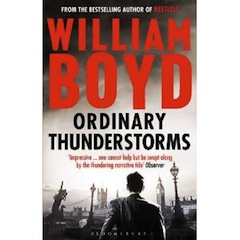
Ordinary Thunderstorms 
By William Boyd, 403 pages, published the 7th June 2010 by Bloomsbury Publishing PLC (978-1408802854)
A simple story, with a thin plot but great ingredients: well described scenarios, good set of characters, believable events, which cast it into a very compelling thriller.
The pace, except for some conclusion events which feel rushed and unconnected, is rather slow. However, this contributes in fact to increase the pleasure of the reading. And this is probably the most fitting description of this book: a very pleasant reading.
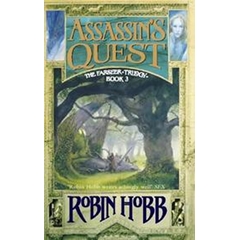
Assassin's Quest 
By Robin Hobb, 848 pages, published the 3rd September 2007 -reissue- by Harper Voyager (978-0006480112)
This is the last book in the Farseer Trilogy, and, as expected after the second part, I could not hold long time without completing the series.
Robin Hobb is a great writer, and traps you completely on the story. As with the previous parts, the story is brilliant, complex, really well concocted, a ruby on fantasy. It fails, perhaps, to transmit emotions: although many pages are spent on the pain of Fitz, the main character, enduring the distance from his love, his friends, there is no enough closeness to that character to feel it.
On the another side, the style gets better, more mature I would say, comparing it to the other books of the trilogy. Definitely 3 great fantasy books.
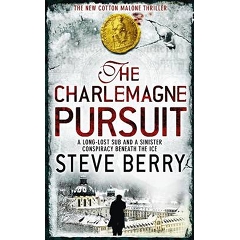
The Charlemagne Pursuit 
By Steve Berry, 608 pages, published the 29th October 2009 by Hodder Paperbacks (978-1444709766)
I had already read a book -The Venetian Betrayal- by this author, belonging to the same series, and I had been very disappointed -although not to the point of dropping the reading-. I was then dismayed to start reading this one and discover the same main character and type of action. My fault, obviously, picking too quickly a book from the bookshop.
The background history is now less interesting, but the development and the situations have improved in comparison to that first book. Perhaps by the time that the main character, one Mr Cotton, gets retired, the series will have acquired some value.
In short: fast pace, historic background on Dan Brown style but far less refined, and a thriller story that holds not even a superficial examination. And better not to write about the characters...
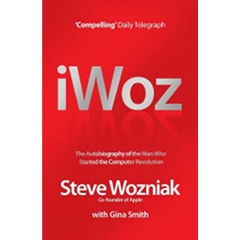
iWoz 
By Steve Wozniak, 252 pages, published the 9th August 2007 by Headline Review (978-0755314089)
From a geek perspective, this book is an absolute must. And the book is, on its own, quite engaging at moments, with funny stories and anecdotes.
There is a lot of bragging, through. iWoz even excuses himself for his attitude, explaining that that was exactly his super-life, and the book is an autobiography. But that bragging is very discouraging, and happens during all the book.
The autobiography, as usual, is linear, although the main focus is on his student years and around the time Apple went corporate. Which is also the most interesting part of the book -its student years helps a lot to understand how the Apple II was ever designed-. But, afterwards, the biography becomes quite loose. For example, it is mentioned his creation of another company, CL 9, but almost nothing is included on what happened then -except to mention his stay at Hawaii, unable to code the remote control-. Then, there are the stories about the concerts he organized, the millions he lost with that and how happy he was, all the same, because everybody was having a lot of fun.
This is the biography of a very clever and interesting guy, who achieved a lot in short time. I just hope that somebody will write once the real iWoz biography, not just his own story.
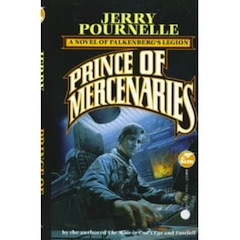
Prince Of Mercenaries 
By Jerry Pournelle, 338 pages, published the 31st October 1993 by Baen Books (978-0671698119)
Easy summer reading, placing a quite straightforward war strategy mission on a science fiction world.
Great style on a very well connected story. The science fiction side is also well founded, although mainly a support to delimit the battle strategies.
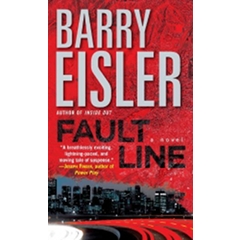
Fault Line 
By Barry Eisler, 352 pages, published the 27th April 2010 (reprint) by Ballantine Books (978-0345505095)
I read in the past the whole John Rain series by this author, very fast action books with some oriental taste, so I quickly grabbed this book on the local bookshop. It still shares the same basis with that series, fast action to grab the reader's attention, although it misses the bonus point of an interesting central character.
But the story is, at the very best, definitely weak. There is a government conspiracy, naive, too simple; and the main focus on the book, the story around a cryptography invention, is almost an insult to anybody knowing even just a bit about cryptology. And the relationships, the characters, are even weaker points
On the other side, sticking just to the action, it has a great fun punch, and it didn't last 24 hours before I turned over its last page.
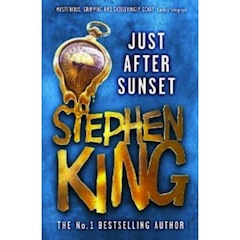
Just After Sunset 
By Stephen King, 544 pages, published the 1st August 2009 by Hodder Paperbacks (978-0340977187)
Terror stories is not among my favorites literary styles. However, I have been an avid reader of Stephen King since I first read It -which I have devoured 3 or 4 times-. I have read many of his books, also those published under his pseudonym Richard Bachman, but, in any case, I am sure to have missed at least half of his titles.
What I really like on his books are the stories. The way the stories develop, up to that turning point where they become totally extraordinary: in most of the cases, this does not happen until the story is well advanced, and then, well, I am already immersed in the story, and I am willing to accept any caprice of his imagination. Because, even then, the story still goes ahead (normally including some apocalyptic weather, where all terror explodes, etc.)
So I was initially disappointed when I discovered that this book was a collection of short stories, being my point that then there would be short space to develop the story before something very much out of the ordinary would happen. However, quite the opposite happened, and I would terminate story after story, anxiously expecting the next one. Not that all the stories are good; in fact, out of 13 stories I could not stand 5 of them; 3 others were fine, and the other 5 really good.
Cryptonomicon 
By Neal Stephenson, 1168 pages, published the 31st December 2002 by Harper Perennial (978-0060512804)
Outstanding book; lots of Maths, some cryptography, some physics in the middle, great computing staff, interesting thoughts on startup companies, some law conspiracies even, and all very nicely mixed inside a second World War story, story that spawns until the present (being the present late 90s). Then, the author does not forget to include plenty of humor, and it gets at moments hilarious.
I would say that it contains a lot of very interesting ingredients, some added in exaggerated quantities: at times, the book becomes almost Math digressions, including, for example, the analysis on the masturbation on the wellness of one character, together with nice charts!
This book is just a master piece, I am in pure awe of Neal Stephenson.
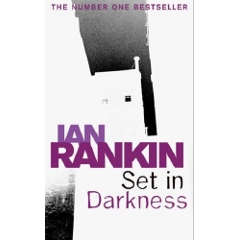
Set In darkness 
By Ian Rankin, 496 pages, published the 7th August 2008 by Orion (978-0752883632)
Quite the typical John Rebus novel, at times darker than usual -as the title reflects-.
It is probably one of the best in the Rebus series, at least related to the ambiance it creates. The plot is rather lineal, more interesting by tangling several cases together and adding some history on the cocktail.
Perhaps its weakest point if the end, which if nicely unexpected, is also slightly disappointing.
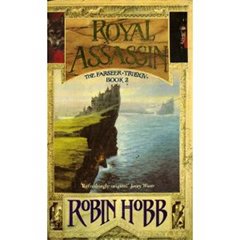
Royal Assassin 
By Robin Hobb, 768 pages, published the 3rd September 2007 (reissue) by Harper Voyager (978-0006480105)
I read the first part last year, and what I wrote then applies quite well for this fantastic second part. It is even better, more solid, although also with much more fiction. Ravenous, thinking already on the 3rd part.
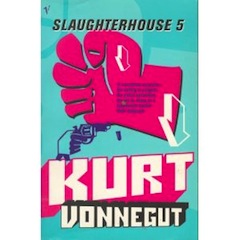
Slaughterhouse 5 
By Kurt Vonnegut, 176 pages, published in 1991 by Vintage (978-0099800200)
An auto-referent book, where the motifs behind it are part of the book itself, and the book seems totally alien to the story is trying to tell. That's it, I am more drawn to the style of the book than to the story that it tells, or that it intends to tell.
You see, the main point of the book is the story behind, the bombing of Dresden, and the unnecessary death of far more people than Hiroshima or Nagasaki killed. But what I remember from the book is the style, the prose of Vonnegut, his way to tell things. I guess I am just another Tralfamadorian, able to watch the Earthling Zoo, thinking that there is nothing to solve. I pay full tribute to the cleverness of this book, although it still failed to move me.
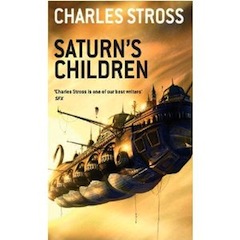
Saturn's Children 
By Charles Stross, 400 pages, published the 2nd July 2009 by Orbit (978-1841495682)
Huge. I hadn't read science fiction for quite a long time, and I was frankly rusty for the exhibition of imagination in this book, just amazing.
I am not sure what I really prefer: if the realism of the actions -interplanetary trips that take indeed months or years, the boredom during those trips-, the often used scientific explanations, the ironies and humor -these are robots, bored robots, even with existential problems-, or the erotism -yes, even with robots-.
Then, it comes the plot, as imaginative as the descriptions of unknown worlds, and really twisted. Of course, it is a plot where basic logical rules do not apply, so it is quite a challenge to follow.
A definitely recommended book, if only to be part, for a while, of a completely different world.
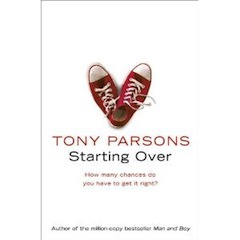
Starting Over 
By Tony Parsons, 320 pages, published the 6th August 2009 by Harper (978-0007226511)
Not bad, but not really good.
A story that it is supposed to be touching, but I am afraid it is not. And then, there is not much more: no humor, no action, no drama.
But it is still good as the story of some (strange) daily life.
Recommended: not really; I think the book is above average because the writer is good at telling a mediocre story.
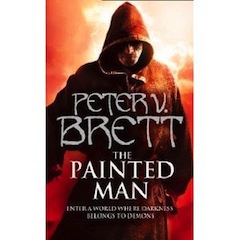
The Painted Man 
By Peter V. Brett, 560 pages, published the 2nd April 2009 by CollingsVoyager (reprint) (978-0007276141)
Not a great start, a bit heavy. Then, quickly, it becomes painful to drop the book. By the time it is finished and you realize that there is a continuation, the sequel book is just a necessity. Alas, in this moment is not available (only in hardcover, which I try to avoid on principle).
It is a fantasy book, a world populated by the darkness, and the story of who revels against it. The story is carefully described, all steps well connected, and the best: the story does not end with the book, it is just the first of a trilogy: The Demon Trilogy.
The story is huge. There are so many aspects that the author could just pursuit, I wonder if he does on the other books on the trilogy. Definitely not on the same level of Tolkien, but the comparison is already good, just because it can be done.
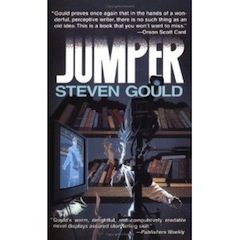
Jumper 
By Steven Gould, 352 pages, published the 1st January 1992 by Tor Books (978-0812522372)
Jumper is a great nerdy story; cover to cover in a couple of days, fun ensured.
Now, it is true that the story is too simple -but, as Orson Scott Ward says-, what a great way to write such simpleness.
It differs from the movie's story -there is a separate adaptation, called "Jumper: Griffin's story"-; I saw the movie, nice, but only in the way that it plays with the teleporting idea. The movie introduces some enemies to the Jumpers, and the religious idea behind those enemies is too stretched.
I doubt I will ever read the movie's book, my recommendation goes definitely for this story, and I am already thinking on its continuation (Reflex - 978-0812578546).
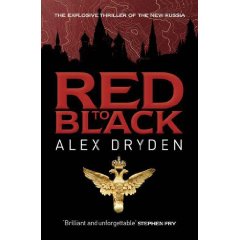
Red To Black 
By Alex Dryden, 512 pages, published the 5th March 2009 by Headline Review (978-0755345014)
Very atypical spy fiction, short on action, but large in ambiance, mixing carefully facts and fiction to draw a more than credible story.
The story itself is by moments on the very fictional side, but the conclusions, even if (very) alarmist, are worth considering: they draw a picture of the actual Russia that, even being biased, is quite frightening.
Great reading, once the first chapters are over. The nice ambiance is only achieved later, by the middle of the book; up to that moment, I seriously considered dropping the book for good. Relieved I didn't!
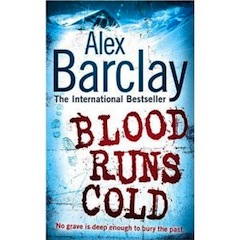
Blood Runs Cold 
By Alex Barclay, 496 pages, published the 1st December 2008 by Harper (978-0007268443)
The book is well written, but the thriller lacks consistency, is quite disjointed. And the style is quite dense; I started reading the book and then I dropped it for 4 months -but the same happened with all the books in this period, perhaps it was just my reading mood, or perhaps I just did too many bad choices.
There are lot of clues in the book without meaning on its own: kind of a book on a series, where the previous books are missing. But, as it happens, this is the first book of the author with these characters, so she is probably just laying the basis for others books to come.
Whatever is the reason, there is a feeling, after reading the book, that much information is missing. Specially the very last chapters, they are pretty successful at confusing any reader (in a poor, no clever manner, I should add).
Perhaps this review looks discouraging, but, in fact, I kind of enjoyed the reading.
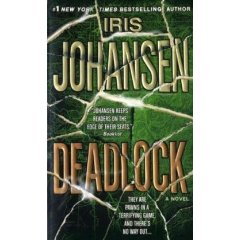
Deadlock 
By Iris Johansen, 284 pages, published the 20th October 2009 by St. Martin's Press (978-0312368104)
Boring. But, to its credit, I was able to finish it -barely-.
It mixes a lot of action with banal lengthy conversations, trying to push a feminist message in the wrong context.
Burn in peace.
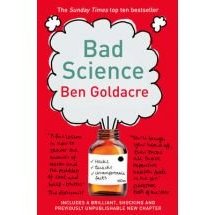
Bad Science 
By Ben Goldacre, 288 pages, published the 2nd April 2009 by HarperPerennial (978-0007284870)
I have been reading this book slowly, a chapter from time to time, for about 5 months. It is interesting, well written, and with just too many good points, although not a reading pleasure.
Bad Science attacks mainly two points: the alternative Medicine -like homeopathy-, and the media coverage of Medicine and Science in general. And the author seems on a mission to make everybody realize their dangers; to such a point that I was surprised to find a picture of the author on the back cover and discover that he was quite young (thirtyish when he wrote it), quite different from the impression I had: an old chap, burned out after many years of fighting stunts with the media or the alternative medicine.
While I think that the book could condensate its content in less pages, its ideas are very much worth spreading.
During these months, I bought a second book, Irrationality, which shares some content with Bad Science, but has, in my opinion, a wider scope, a better argumentation, and some more humor within.
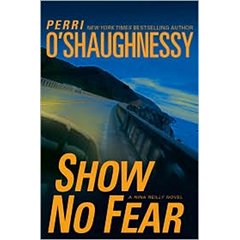
Show No Fear 
By Perry O'Shaughnessy, 464 pages, published the 20th October 2009 by Pocket Star (978-1416548676)
This is one of those books belonging to a series, centered about a recurrent character, in this case a lawyer student / assistant called Nina Reilly. I am not sure if the idea is to create a bond on the reader to that character, to better sell other books, or it is simply that the author is able to reuse it then more easily, not having to create new characters in future books.
I guess this works sometimes: Inspector Rebus, Lisbeth Salander, or, definitely, Calvin and Hobbes.
Because this Nina Reilly is perhaps the only element in the book with some depth, as the rest of the characters in the book, are all quite extreme, like extracted from a psychology book outlining how the good people behave and how are the bad ones; this makes the story a tad weaker and the book less pleasant to read.
Nevertheless, the story is rather good; the suspense is not lifted in the latest moment, as the first scene has already the clues of the whole development. Perhaps the end is precipitated, rushing to a conclusion, in opposition to the slow pace of the rest of the book. In short, the book is slightly better than passable.